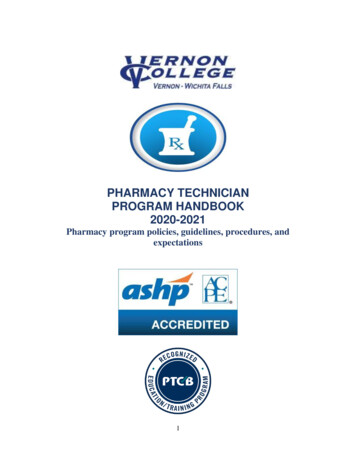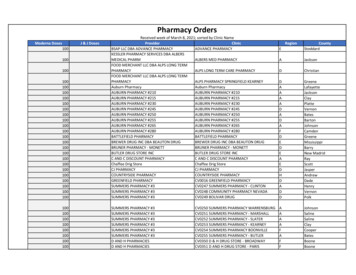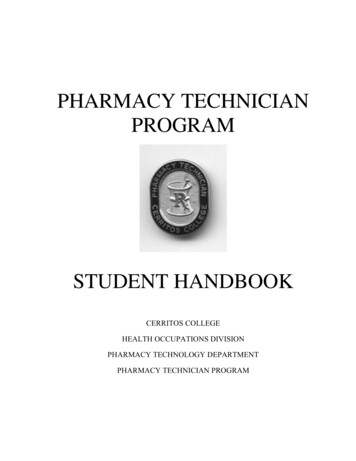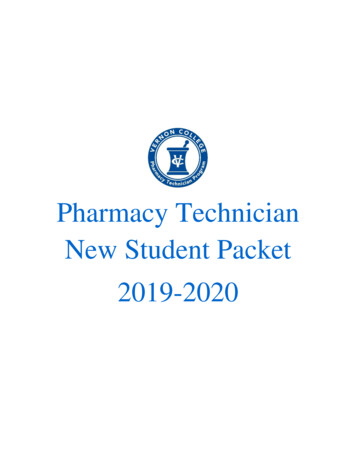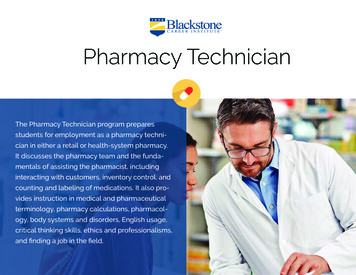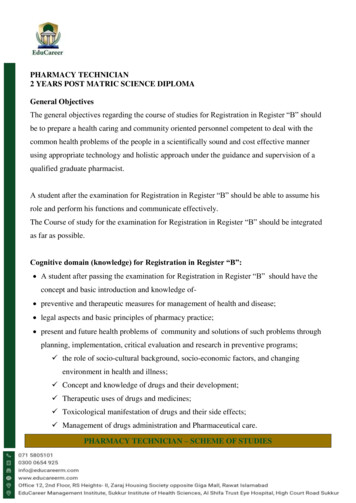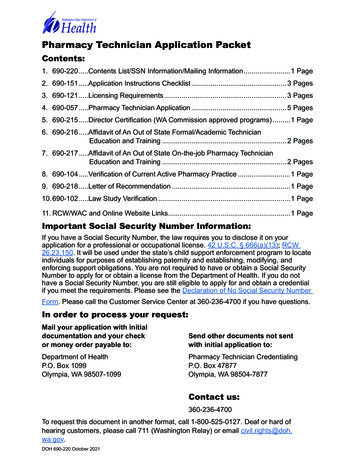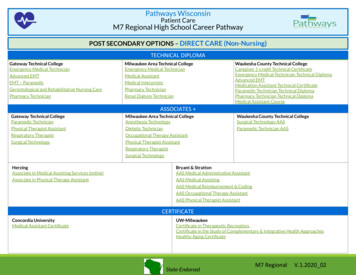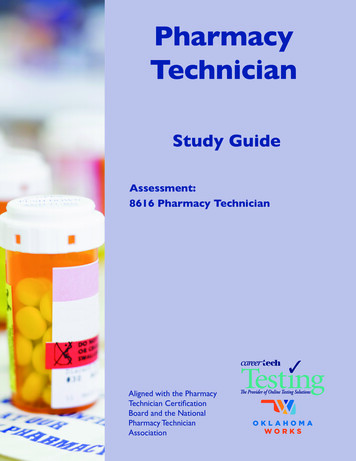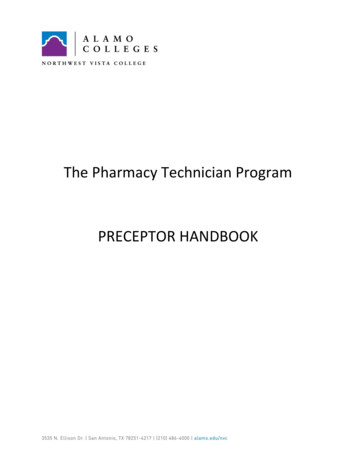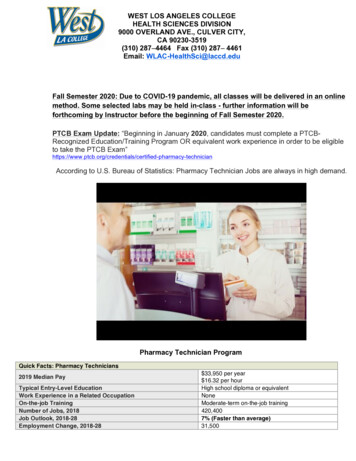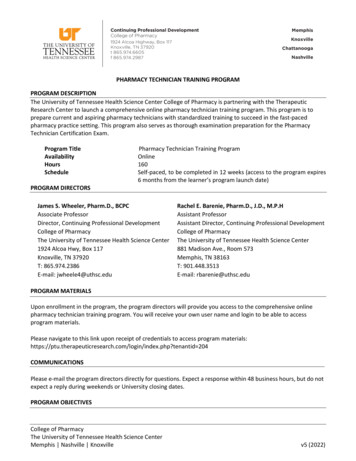
Transcription
Continuing Professional DevelopmentCollege of Pharmacy1924 Alcoa Highway, Box 117Knoxville, TN 37920t 865.974.6605f ARMACY TECHNICIAN TRAINING PROGRAMPROGRAM DESCRIPTIONThe University of Tennessee Health Science Center College of Pharmacy is partnering with the TherapeuticResearch Center to launch a comprehensive online pharmacy technician training program. This program is toprepare current and aspiring pharmacy technicians with standardized training to succeed in the fast-pacedpharmacy practice setting. This program also serves as thorough examination preparation for the PharmacyTechnician Certification Exam.Program TitleAvailabilityHoursSchedulePROGRAM DIRECTORSPharmacy Technician Training ProgramOnline160Self-paced, to be completed in 12 weeks (access to the program expires6 months from the learner’s program launch date)James S. Wheeler, Pharm.D., BCPCAssociate ProfessorDirector, Continuing Professional DevelopmentCollege of PharmacyThe University of Tennessee Health Science Center1924 Alcoa Hwy, Box 117Knoxville, TN 37920T: 865.974.2386E-mail: jwheele4@uthsc.eduRachel E. Barenie, Pharm.D., J.D., M.P.HAssistant ProfessorAssistant Director, Continuing Professional DevelopmentCollege of PharmacyThe University of Tennessee Health Science Center881 Madison Ave., Room 573Memphis, TN 38163T: 901.448.3513E-mail: rbarenie@uthsc.eduPROGRAM MATERIALSUpon enrollment in the program, the program directors will provide you access to the comprehensive onlinepharmacy technician training program. You will receive your own user name and login to be able to accessprogram materials.Please navigate to this link upon receipt of credentials to access program n/index.php?tenantid 204COMMUNICATIONSPlease e-mail the program directors directly for questions. Expect a response within 48 business hours, but do notexpect a reply during weekends or University closing dates.PROGRAM OBJECTIVESCollege of PharmacyThe University of Tennessee Health Science CenterMemphis Nashville Knoxvillev5 (2022)
Continuing Professional DevelopmentCollege of Pharmacy1924 Alcoa Highway, Box 117Knoxville, TN 37920t 865.974.6605f on completion of this program, each learner should be able to: Differentiate between duties allows and not allowed of a pharmacy technician Practice within the scope of practice of a pharmacy technician Translate medical terminology and sig codes Calculate drug dosages, concentrations, quantities, and days’ supply Prepare prescriptions and medication orders Practice billing procedures for medications and supplies Follow inventory policies and procedures Classify different pharmacologic classes of medications Assist the pharmacist in medication therapy management Demonstrate medication reconciliation Prepare unit-dose orders and products for medication carts Demonstrate sterile and non-sterile compounding Demonstrate compounding procedures for chemotherapy agentsPROGRAM EXPECTATIONSThe following guidelines are intended to create a comfortable and productive learning environment through theprogram.The learner can expect the course directors to: To provide prompt access to program materials To be accessible during the 12-week program enrollment period To answer questions and provide guidance, when possible, during the 12-week program enrollmentperiodThe program directors can expect the learner to: To complete courses in the program in 12-weeks To spend an adequate amount of time on the program each week, making an effort to learn and completequizzes To see help when appropriateASSESSMENTSThree attempts are given for each module quiz and final exam. The minimum pass scores are as follows: Unit Exams – 80% Midterm – 80% Final exam – 75%PHARMACY TECHNICIAN CERTIFCATION EXAM FEELearners may be eligible for a voucher, which covers the cost of the exam, to sit for their Pharmacy TechnicianCertification Exam. The only exam eligible for a voucher is the Pharmacy Technician Certification ExamCollege of PharmacyThe University of Tennessee Health Science CenterMemphis Nashville Knoxvillev5 (2022)
Continuing Professional DevelopmentCollege of Pharmacy1924 Alcoa Highway, Box 117Knoxville, TN 37920t 865.974.6605f ministered by the Pharmacy Technician Certification Board (see: https://www.ptcb.org). To be eligible for avoucher, learners must meet the following requirements: passage of all program assessments in the PharmacyTechnician Training Program and completion of the program in 3 consecutive months from the learners start-date(or in the timeframe agreed upon by the learner and course directors). Failure to meet these requirements mayrender the learner ineligible for an exam voucher. If you require a modification to the 12-week program timeline,please email Dr. Barenie prior to your course start date.PROFESSIONAL CONDUCTLearners are expected to act in a professional manner in all interactions with the program directors, staff, andother learners.PROGRAM DISHONESTYReceiving help from another learner or any other person to complete module assessments or any other programwork is prohibited. Learners found in violation of this policy may not be eligible for the pharmacy techniciancertification exam voucher.PROGRAM FEESThere are no refunds for the Pharmacy Technician Training Program. Please check with the Board of Pharmacy inthe state you plan to practice (or are practicing) to determine your eligibility and the requirements to become apharmacy technician. If you are interested in a payment plan, please email the course directors. The paymentplan will consist of 3 installments of 600 to be due on the first day of each consecutive month the learner isenrolled in the program. If timely payment is not received, the course directors reserve the right to suspendaccess to the Pharmacy Technician Training Program.PROGRAM SCHEDULEProgram location: Online. It is recommended to complete on average 15 hours week to complete the program in12 weeks.TitleTypeHours DescriptionProof of EnrollmentDidactic Administrative0.1Documents the student's enrollment in the pharmacytechnician training program.Policy AttestationDidactic Administrative0.1Students must review and attest to their understandingof the program policies and procedures.PTU OrientationDidactic0.1Welcomes new students into the program with anoverview of online learning and instructions on how tonavigate through Pharmacy Technicians University.College of PharmacyThe University of Tennessee Health Science CenterMemphis Nashville Knoxvillev5 (2022)
Continuing Professional DevelopmentCollege of Pharmacy1924 Alcoa Highway, Box 117Knoxville, TN 37920t 865.974.6605f le of the PharmacyTechnicianDidactic2Role of the PharmacyTechnicianSupporting MaterialsDrug InformationResourcesDidactic Supporting0.5Didactic2Laws AffectingPrescriptionDispensingDidactic2Laws AffectingPrescriptionDispensingSupporting MaterialsDrug Regulation andControlDidactic Supporting2.5A detailed look at HIPAA (Health Information Portabilityand Accountability Act) Security and Privacy.Didactic2.5Learn how medications are regulated when going tomarket and when they are recalled or withdrawn. Walkthrough the phases of a drug’s approval process and thepharmacy tech’s role with investigational drugs. Also,understand the elements of brand-name patents andgeneric meds. Learn what’s involved with genericsubstitution using the Orange Book, along withunderstanding the differences among pharmaceuticaland therapeutic alternatives.College of PharmacyThe University of Tennessee Health Science CenterMemphis Nashville KnoxvilleThis course provides a look into the roles andresponsibilities of pharmacy technicians and otherpharmacy staff. Learn about the duties of the technicianin various pharmacy A look into the roles andresponsibilities of pharmacy technicians and otherpharmacy staff. Learn about the duties of the technicianin various pharmacy settings, along with therequirements necessary to become a technician and tomaintain technician status. Also, learn about the manyorganizations available for pharmacy technicians to joinand their mission to advance pharmacy practice.Read about how technician roles are expanding as wellas advanced certifications.In this course you'll see how package inserts areorganized and what information can be found in eachsection. Work through an interactive exercise looking upinformation in a medication's package insert. Plus, learnabout various professional resources available topharmacy technicians that are used to retrieve medicalinformation.A comprehensive look into the federal laws andregulations that govern medication dispensing.Understand the importance of the laws and regulationsgoverning medication dispensing and how they relate tothe pharmacy technician’s role. Also, understand theresponsibilities of federal regulatory agencies thatimpact the dispensing of medications.v5 (2022)
Continuing Professional DevelopmentCollege of Pharmacy1924 Alcoa Highway, Box 117Knoxville, TN 37920t 865.974.6605f ug RegulationSupporting MaterialsDidactic Supporting1A detailed look at investigational drugs. Also,understand and learn practice tips for handlingmedications used "off-label," drug recalls and marketwithdrawals, as well as proper generic cted DrugProgramsDidactic1.5A comprehensive learning experience about DEA (DrugEnforcement Administration), as well as the laws andregulations that pertain to the classification, prescribing,and dispensing of controlled substances. Understand therequirements for managing controlled substanceinventory and recordkeeping, along with exploring therequirements for transfers, proper disposal, and handlingdiversion.Understand which medications have specialrequirements when being prescribed and/or dispensed.Learn about the regulations behind these requirements,the details of the requirements, and the role of thepharmacy technician.Restricted DrugPrograms SupportingMaterialsDidactic Supporting1.5State Laws andRegulationsDidactic1.5Unit Exam IDidactic - Exam0.5An exam covering the following course materials: Role ofthe Pharmacy Technician, Drug Information Resources,Laws Affecting Prescription Processing, Drug Regulationand Control, Controlled Substances, and Restricted n completing the course activities, you’ll learn commonmedical terminology used in the pharmacy. Use wordparts to determine the meaning of medical terms, bodyparts, drug names and classes, and diseases andconditions. Translate abbreviations and symbols that areCollege of PharmacyThe University of Tennessee Health Science CenterMemphis Nashville KnoxvilleGain valuable practice techniques as it pertains tomedications with special prescribing and/or dispensingrequirements. Take a detailed look into CombatingMethamphetamine Abuse and how it pertains topseudoephedrine sales.Learn the state-specific laws and regulations for the roleof the pharmacy technician, duties that can and cannotbe performed by a technician, and requirements tobecome a technician. Understand the differencebetween federal and state laws as it pertains toprescribing and dispensing meds, as well as controlledsubstance and recordkeeping requirements.v5 (2022)
Continuing Professional DevelopmentCollege of Pharmacy1924 Alcoa Highway, Box 117Knoxville, TN 37920t 865.974.6605f ed to write prescriptions. Also, find out whichabbreviations and symbols are error prone and should beavoided.This course provides a detailed look into drug nameabbreviations to help understand what they really mean,along with practice techniques to avoid errors.PharmaceuticalTerminologySupporting MaterialsDidactic Supporting0.5Medication SafetyDidactic2Learn what a medication error is, how they occur, andhow they can be prevented. Understand how to handleand report medication errors appropriately to help keeppatients safe and help prevent the same error fromhappening again. Also, learn about safety data sheets,which meds require them, and how they help maintainsafety in the pharmacy.Medication SafetySupporting MaterialsDidactic Supporting MaterialsDidactic Supporting2.5CommunicationSupporting MaterialsPart IIDidactic Supporting2.5Unit Exam IIDidactic - Exam0.5A detailed look into medication safety by understandingpoints of care that can lead to medication errors. Reviewtechniques in practice that can prevent medicationerrors with over-the-counter medications.See how proper communication is essential to workingwith patients, pharmacy colleagues, and otherhealthcare staff. Learn techniques that can be used toeffectively communicate verbally and nonverbally withpatients who have vision or hearing impairment,language barriers, or other challenges.A detailed look into using proper communication andcare with gender-diverse patients and patients ofdifferent cultures. Understand the pharmacy’s role inteam-based care for positive patient outcomes. Also,review practice tips for enhancing soft skills that are vitalin the pharmacy.Learn important skills for effective training andmentoring, as well as conflict management skills toreduce and resolve conflict and violence in thepharmacy.An exam covering the following course materials:Pharmaceutical Terminology, Medication Safety, .5College of PharmacyThe University of Tennessee Health Science CenterMemphis Nashville KnoxvilleSee how foundational math concepts preparetechnicians for performing pharmacy calculations. Learnthe rules for working with roman numerals and theirv5 (2022)
Continuing Professional DevelopmentCollege of Pharmacy1924 Alcoa Highway, Box 117Knoxville, TN 37920t 865.974.6605f rrent use in the pharmacy. Also, practice adding,subtracting, multiplying, and dividing with fractions anddecimals.Use conversion factors from multiple measuring systemsto convert between units. Practice calculating withprescriptions that need converting in order to accuratelyprepare the products.MeasurementCalculationsDidactic1.5Basic PharmaceuticalCalculationsDidactic2.5Dosage porting MaterialsDidactic Supporting0.5This course provides a detailed look on how to calculateday’s supply for various dosage forms. Includes a cheatsheet for calculating day’s supply for meds with fixedquantities.Business CalculationsDidactic1.5Understand and learn how to calculate businessconcepts such as turnover, markup, and profit.Unit Exam IIIDidactic - Exam0.75Basic PharmaceuticsDidactic7An exam covering the following course materials:Introductory Calculations, Measurement Calculations,Basic Pharmaceutical Calculations, Dosage Calculations,and Business Calculations.This course provides an opportunity to learn aboutvarious dosage forms used to deliver medication as wellas the characteristics of, and auxiliary labels used for,each dosage form. Learn how to calculate quantity todispense and days’ supply for dosage forms requiringunique calculations. Plus, understand the nuancesinvolved with medications that require reconstitution.Basic PharmaceuticsSupporting MaterialsDidactic Supporting1.5A detailed look into transdermal patches, eye and earmedications, inhaled products, and oral dosage forms.Plus, learn which tablets and capsules can be crushed,opened, or split.Basic Anatomy &PhysiologyDidactic2Learn basic body parts and their function for thecirculatory, dermatologic, endocrine, gastrointestinal,College of PharmacyThe University of Tennessee Health Science CenterMemphis Nashville KnoxvilleThis course covers ratios and proportions and howthey’re used in the medication-use process. Use ratiosand proportions to calculate dispense quantities anddays’ supply.Learn how to calculate dosages for pediatric and adultpatients. Practice calculating dosages for parenteralmeds, and meds dosed in milliequivalents and units.v5 (2022)
Continuing Professional DevelopmentCollege of Pharmacy1924 Alcoa Highway, Box 117Knoxville, TN 37920t 865.974.6605f Didactic2VaccinesDidactic2.5Vaccines SupportingMaterialsDidactic Supporting0.5HIV TrainingDidactic anoogaNashvillehematologic, immune, musculoskeletal, nervous, renal,reproductive, respiratory, ophthalmic, and otic systems.See how foundational pharmacology concepts preparestudents for more in-depth pharmacology modules andequip technicians in the pharmacy to help spot mederrors. Learn about common disease states by bodysystem, how medications work in the body, and howthey’re eliminated. Also, practice spotting mix-ups withprescription directions and diagnoses. Also, utilize aresource about common labs tests and their clinical use.Learn basic pharmacology of anti-infectives and howthey work on diseases/conditions of the immune system.Course content includes terminology, therapeutic classesof drugs, indications, side effects, monitoring,interactions, precautions, and generic and brand names.Gain an understanding of vaccines by learning the typesof vaccines, immunization schedules, storagerequirements, vaccine allergies, interactions and adversereactions, as well as identify the supplies and paperworkrequired for vaccines.Review important information on HPV vaccinations andupdated Tdap recommendations. Plus, read through acase study and comprehensive review on the basics ofimmunizations and vaccines.In this course you’ll gain an understanding of HIV andAIDS by learning the etiology and epidemiology, types oftesting and need for counseling, infection controlguidelines, clinical manifestations, legal and ethicalissues, confidentiality, and drug treatment.In the following modules, you’ll learn basicpharmacology of respiratory medications and how theywork on diseases/conditions of the respiratory system.Course content includes terminology, therapeutic classesof drugs, indications, side effects, monitoring,interactions, precautions, and generic and brand names.Learn basic pharmacology of dermatologic medicationsand how they work on diseases/conditions of theintegumentary system. Course content includesterminology, therapeutic classes of drugs, indications,side effects, monitoring, interactions, precautions, andgeneric and brand names.0.5College of PharmacyThe University of Tennessee Health Science CenterMemphis Nashville Knoxvillev5 (2022)
Continuing Professional DevelopmentCollege of Pharmacy1924 Alcoa Highway, Box 117Knoxville, TN 37920t 865.974.6605f 865.974.2987IntegumentaryMedicationsSupporting MaterialsOphthalmic/OticMedicationsDidactic SupportingMemphisKnoxvilleChattanoogaNashvilleA review of therapies used for head lice, bug bites andstings, and poison ivy, oak, and 2GastrointestinalMedicationsSupporting MaterialsCardiovascularMedicationsDidactic Supporting0.5Didactic4Learn basic pharmacology of the medications that treatdiseases/conditions of the cardiovascular system.Course content includes terminology, therapeutic classesof drugs, indications, side effects, monitoring,interactions, precautions, and generic and brand names.CardiovascularMedicationsSupporting MaterialsRenal SystemDidactic Didactic1.5MusculoskeletalMedicationsSupporting MaterialsDidactic Supporting1A comprehensive look at dispensing cholesterol-loweringmedications, and the ins and outs of dispensinginjectable anticoagulants.Learn the anatomy and physiology of the renal system,plus a detailed look at therapies used for treatmentsassociated with the kidneys.In this course, you’ll learn basic pharmacology ofmedications used to treat diseases/conditions of themusculoskeletal system. Course content includesterminology, therapeutic classes of drugs, indications,side effects, monitoring, interactions, precautions, andgeneric and brand names.This course provides a comprehensive review of safe usewith acetaminophen and opioids. Plus, an overview oftherapies used for restless legs syndrome andosteoporosis.Didactic0.5College of PharmacyThe University of Tennessee Health Science CenterMemphis Nashville KnoxvilleIn this course, you’ll learn basic pharmacology ofmedications that treat diseases/conditions of the eyesand ears. Course content includes terminology,therapeutic classes of drugs, indications, side effects,monitoring, interactions, precautions, and generic andbrand names.In the following modules, you’ll learn basicpharmacology of medications used to treatdiseases/conditions of the gastrointestinal system.Course content includes terminology, therapeutic classesof drugs, indications, side effects, monitoring,interactions, precautions, and generic and brand names.A review of gluten in medications and how to handlequestions that come up.v5 (2022)
Continuing Professional DevelopmentCollege of Pharmacy1924 Alcoa Highway, Box 117Knoxville, TN 37920t 865.974.6605f 865.974.2987Opioid Epidemic NaloxoneNervous SystemMedicationsDidactic2.5Nervous SystemMedicationsSupporting MaterialsDidactic eMedicationsSupporting MaterialsDidactic Supporting0.5Reproductive SystemMedicationsDidactic1.5Reproductive SystemMedicationsSupporting MaterialsDidactic Supporting1NutritionDidactic1College of PharmacyThe University of Tennessee Health Science CenterMemphis Nashville KnoxvilleMemphisKnoxvilleChattanoogaNashvilleLearn about opioid use disorder, management, andtreatment. Also, read answers to common questionsand myths about naloxone use for opioid overdose.In this course, you’ll learn basic pharmacology ofmedications used to treat diseases/conditions of thenervous system. Course content includes terminology,therapeutic classes of drugs, indications, side effects,monitoring, interactions, precautions, and generic andbrand names.Listen to a presentation on treatments for posttraumatic stress disorder (PTSD) in adults, plus acomprehensive review on therapies for ADHD, includingtips for dispensing and possible drug interactions.Learn basic pharmacology of medications used to treatdiseases/conditions of the endocrine system. Coursecontent includes terminology, therapeutic classes ofdrugs, indications, side effects, monitoring, interactions,precautions, and generic and brand names.This course provides a review of diabetes, including, howto improve care for diabetic patients, prevention oferrors between regular and concentrated insulin, needleand syringe size selection, and prevention and treatmentof hypoglycemia. Plus, get answers to commonquestions about levothyroxine and managinghypothyroidism.In the following modules, you’ll learn basicpharmacology of medications used to treatdiseases/conditions of the reproductive system. Coursecontent includes terminology, therapeutic classes ofdrugs, indications, side effects, monitoring, interactions,precautions, and generic and brand names.This course gives a comprehensive review oftestosterone replacement therapy and hormonalcontraception, including drug selection, and errorprevention. Plus, information on emergencycontraception, drugs used during pregnancy andlactation, and erectile dysfunction treatments.Learn basic pharmacology of dietary supplements withemphasis on drug therapy. Course content includesterminology, therapeutic classes of drugs, indications,v5 (2022)
Continuing Professional DevelopmentCollege of Pharmacy1924 Alcoa Highway, Box 117Knoxville, TN 37920t 865.974.6605f de effects, monitoring, interactions, precautions, andgeneric and brand names.Listen to a presentation about the role of vitamin D.NutritionalSupporting MaterialsDidactic Supporting0.5Cancer MedicationsDidactic0.5Learn basic pharmacology of cancer agents withemphasis on drug therapy. Course content includesterminology, therapeutic classes of drugs, indications,side effects, monitoring, interactions, precautions, andgeneric and brand names.Emerging TherapiesDidactic Supporting0.5Unit Exam IV PharmacologyDidactic - Exam1Review important new drugs that entered the market,along with information on the adverse effects,formulations, dosing, allergy precautions, and more.Also, read through recommendations, clinical resources,and other guidance to help navigate the novelcoronavirus disease 2019 (COVID-19) pandemic and itsimplications in the community and pharmacy practice.A comprehensive exam covering the following courses:Basic Pharmaceutics, Basic Anatomy & Physiology,Pharmacology, Anti-infectives, Vaccines, RespiratoryMedications, Integumentary Medications,Ophthalmic/Otic Medications, GastrointestinalMedications, Musculoskeletal Medications, NervousSystem Medications, Endocrine Medications,Reproductive System Medications, Nutrition, and CancerMedications.Midterm ExamDidactic - Exam2A comprehensive exam for the first half of the program.Prescription Drop-Offand EntryDidactic3.5Prescription Drop-Offand Entry SupportingMaterialsDidactic Supporting1Understand how prescriptions arrive at the pharmacy.Learn the ins and outs of the drop-off window, includingwhich questions to ask patients in order to create orupdate a patient profile and how to verify a prescriptionis written properly. Work within the rules of HIPAAwhen communicating prescription information. Plus,practice inputting prescriptions with an interactiveexercise.A detailed look into managing patient profiles and howto handle drug allergy and drug interaction information.Plus, understand the confusion that can occur with theletter “L.”Didactic5.5College of PharmacyThe University of Tennessee Health Science CenterMemphis Nashville Knoxvillev5 (2022)
Continuing Professional DevelopmentCollege of Pharmacy1924 Alcoa Highway, Box 117Knoxville, TN 37920t 865.974.6605f parationSupporting MaterialsDidactic Supporting2Billing and ThirdParty ProcessingDidactic2.5Unit Exam VDidactic - Exam0.5Inventory Control and DidacticManagement2.5Inventory Control and Didactic ManagementSupportingSupporting Materials0.5College of PharmacyThe University of Tennessee Health Science CenterMemphis Nashville KnoxvilleMemphisKnoxvilleChattanoogaNashvilleLearn how to verify accurate prescription labels, fillprescriptions, and select appropriate auxiliary labels.Plus, understand the ins and outs of hazardous drugs inthe pharmacy. Use automation and other medicationsafety techniques, including how to identify high-alertmeds and look-alike/sound-alike meds. Ask patientsspecific identifiers before releasing a prescription at thepick-up window and provide necessary documentationwith the prescription.A detailed look at what's in store for delivering andmailing prescriptions. Also, find out which medicationsneed to be dispensed in an original container, and howto avoid mishaps when dispensing meds for pediatricpatients. Plus, get information on automated dispensingcabinets, proper med administration, and optimizingpharmacy workflow.This course explains various payers, such as Medicaid,Medicare, TRICARE, HMOs, PPOs, and other aids forpayment. Learn third-party billing terminology andprocesses used to bill patients’ insurance for prescriptionmedications. Learn to troubleshoot rejections frompayers, as well as, how to effectively communicate billingissues with patients. This course also covers a look intodurable medical equipment and medical supplies. LearnMedicare's requirements for billing and documentingdurable medical equipment and supplies as well asreview ways to prevent problems during a Medicare orthird-party payer audit.An exam covering the following course materials:Prescription Drop-Off and Entry, PrescriptionPreparation, and Billing and Third-Party Processing.Gain an understanding of suppliers used by pharmaciesto purchase medications. Also, learn how to organizestock, order and reorder meds, as well as check inorders. Develop techniques to keep the pharmacyorganized and medications in date and learn the benefitsof returning medications to suppliers. Practice arrangingmedications in the proper order, based on expirationdates, and complete a new inventory order.This course provides a detailed look into pharmacyinventory, expiration dates, medication storage, andv5 (2022)
Continuing Professional DevelopmentCollege of Pharmacy1924 Alcoa Highway, Box 117Knoxville, TN 37920t 865.974.6605f oper med disposal. Also, learn how to preventcommon mishaps by managing inventory properly.Learn about what makes a drug "special," specialtypharmacies, what goes into dispensing specialty meds, aswell as care for patients who use them.Read answers to common questions about specialtymeds.Specialty MedicationsDidactic Supporting1Specialty MedicationsSupporting MaterialsDidactic Supporting0.5Pharmacy ServicesDidactic1.5Health & WellnessSupporting MaterialsDidactic Supporting1Pharmacy ServicesSupporting MaterialsDidactic Supporting1Smoking CessationDidactic Supporting1.5EmergencyPreparednessDidactic1.5Learn about potential emergencies that can affect thepharmacy. Plus, gain knowledge to personally prepareoneself for an emergency, in addition to the pharmacy.EmergencyPreparednessSupporting MaterialsUnit Exam VIDidactic Supporting0.5A detailed look at how to handle natural disasters andtips to prevent or handle pharmacy robberies.Didactic - Exam0.5An exam covering the following course materials:Inventory Control and Management, Pharmac
Research Center to launch a comprehensive online pharmacy technician training program. This program is to prepare current and aspiring pharmacy technicians with standardized training to succeed in the fast-paced pharmacy practice setting. This program also serves as thorough examination preparation for the Pharmacy Technician Certification Exam.
